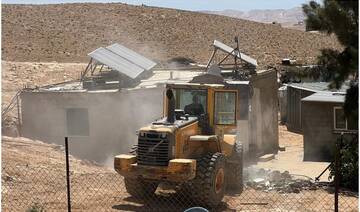TEL AVIV: An Italian tourist was killed and five people were wounded in a car ramming in Tel Aviv on Friday that came hours after two Israeli sisters were killed in a shooting attack in the occupied West Bank.
The attacks, after a night of crossborder strikes in Gaza and Lebanon, added to heightened Israeli-Palestinian tensions following Israeli police raids in Jerusalem’s Al-Aqsa mosque this week.
The tensions threatened to spiral into a wider conflict overnight as Israel responded to a barrage of rockets by hitting targets linked to the Islamist group Hamas in Gaza and southern Lebanon, but the fighting entered a lull on Friday.
However, the two attacks underlined how volatile the situation remains after successive nights of trouble that have drawn worldwide alarm and calls for calm.
In the latest attack, a car plowed into a group on a street near a popular bike and walking path on a Tel Aviv promenade. The driver was shot dead by a nearby police officer when he tried to pull a gun, police said.
An Israeli security source identified the assailant as an Arab citizen of Israel from the town of Kafr Qassem.
Reuters video from shortly after the incident showed a white car upside down on the grass of a park. Police cordoned off the area that was brimming with emergency responders.
The Magen David Adom ambulance service said the victims were all foreign tourists. Italy’s Foreign Minister Antonio Tajani confirmed that an Italian had been killed and other Italians may have been among the wounded.
Earlier on Friday, two Israeli sisters, aged 20 and 16 with joint British nationality, were killed and their mother wounded in a shooting attack on their car near the Jewish settlement of Hamra in the Jordan Valley.
“Our enemies are putting us to the test again,” Prime Minister Benjamin Netanyahu said after visiting the site of the attack with Defense Minister Yoav Gallant.
As soldiers hunted for the gunman, Netanyahu ordered border police reserves and additional military forces to be mobilized to confront the wave of attacks.
The US State Department condemned the attacks, saying “the targeting of innocent civilians of any nationality is unconscionable.”
FLASHPOINT
No claim of responsibility was made for either of Friday’s attacks, but Hamas, the Islamist group that controls the blockaded Gaza Strip, praised them and linked them to the tensions around Al-Aqsa mosque.
Friday prayers passed without major incident and apart from some stone-throwing, police said the situation had been quiet.
Twice this week Israeli police have raided the mosque, where hundreds of thousands of worshippers have been praying during the Muslim holy month of Ramadan, to dislodge groups they said had barricaded themselves with the aim of causing trouble.
Footage of officers beating worshippers who confronted them aroused concern, even among Israel’s allies, and prompted condemnation across the Arab world.
The site in Jerusalem’s Old City, holy to both Muslims and Jews, who know it as Temple Mount, has been a longstanding flashpoint, notably over the issue of Jewish visitors defying a ban on non-Muslim prayer in the mosque compound.
Clashes there in 2021 helped set off a 10-day war between Israel and Hamas. The exchange of crossborder fire awakened memories of that conflict, but as the lull in fighting extended on Friday, neither side seemed keen to prolong the fighting.
“Nobody wants an escalation right now,” an Israeli army spokesman said. “Quiet will be answered with quiet, at this stage I think, at least in the coming hours.”
One official with a Palestinian militant group told Reuters they were ready to keep the calm should Israel do the same, with the group having “made its point.” A Qatari official said Qatar was helping international efforts to de-escalate the situation.
Even before the flare-up of the past few days, the West Bank has seen a surge of confrontations in the past several months, with frequent military raids and escalating settler violence amid a spate of attacks by Palestinians.
Since the beginning of the year, at least 18 Israelis and foreigners have been killed in attacks in Israel, around Jerusalem and in the West Bank. In the same period, Israeli forces have killed more than 80 Palestinians, most of them fighters in militant groups but some of them civilians.
In the aftermath of the overnight strikes in Gaza, streets were largely empty except for some taxis and emergency vehicles. In Gaza City’s Tufah neighborhood some houses and a children’s hospital were damaged.
Taxi driver Muhanad Abu Neama, 23, said his family barely escaped Israeli air strikes that hit near his house, filling rooms with dirt and debris and damaging his car.
“I could hardly see because of the dust, the dirt covered my sisters’ beds and I carried them out one by one,” he said.
With the international-led peace process long moribund, Palestinians’ hopes of creating an independent state in the West Bank and Gaza with East Jerusalem as its capital, have faded. Israel captured East Jerusalem in the 1967 Arab-Israeli war and annexed it as its capital in a move not recognized internationally.
Israel’s new hard-right government is set on expanding Jewish settlements in the West Bank and includes members who rule out a Palestinian state. Hamas for its part spurns coexistence with Israel.



























